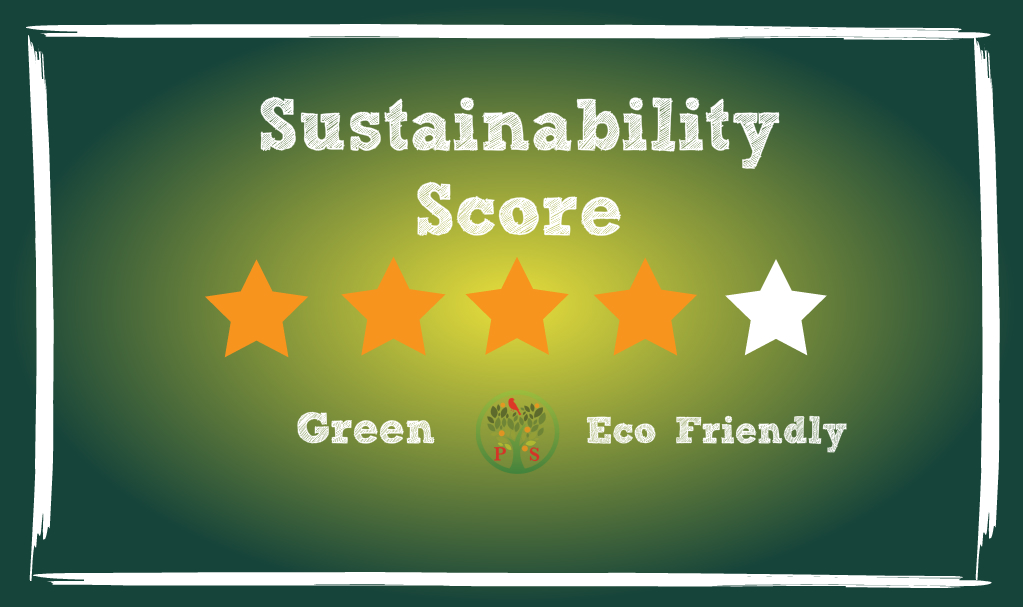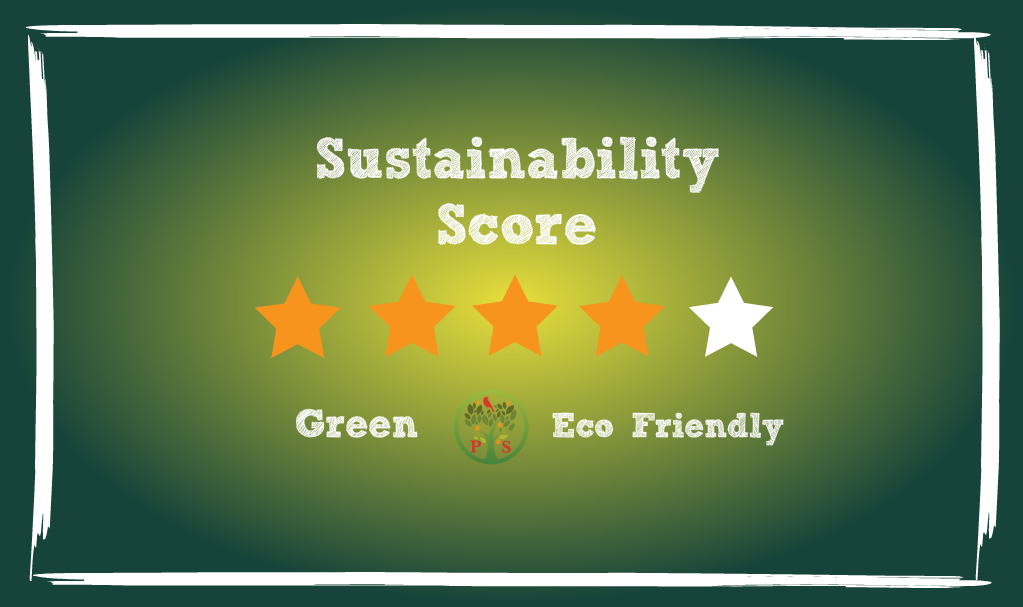
Sustainability Score
What is a Sustainability Score? It can be difficult to determine if something you are looking to buy really is a sustainable product. We want to help ethical consumers, like you, make straightforward, confident decisions about the products you buy. So, we’ve devised a simple and effective scoring system, that provides an overall sustainability score for each product we review.
This means, you can tell at a glance, how a product measures up in terms of it’s environmental and social impact.
Let’s Take a Look on How our Sustainability Score Works.
What We Rate
Our unique sustainability scoring system provides an overview of each product’s sustainability, taking into account 7 key categories for determining the environmental and social impact of a product.
The 7 categories are:
- Eco-Friendly Materials
- Free From Harmful Chemicals
- Zero-Waste
- Social
- Sustainable Packaging
- Product Miles
- Green Certifications
How We Rate: Our Sustainability Score
Products are rated from 5 (Great) to 1 (Avoid if You Can) in each of the seven categories. We look at green products, the sustainable materials that make them up as well as several other indicators of sustainability. The product’s average score is then calculated to provide an overall sustainability rating.
Certifications, accreditations and other standard systems play a key role in informing our assessments. Full marks are often only awarded if a product has a credible, third-party certification.
Let’s have a closer look at how the scoring works within each category.
Category A: Eco-Friendly Materials
This category looks at what materials a product is made from and the impact that these materials have on the environment and our health. We take into account the whole life-cycle of the product, from how raw materials are extracted or grown, to how they are recycled or disposed of at the product’s end-of-life.
The product has to meet one of the features listed in order to be given the corresponding score.
Score: 5
Great
- The product is made from 100% sustainably grown materials, e.g. bamboo, hemp, organic cotton, sustainable timber. The product will have a recognized certification for this e.g. Global Organic Textile Standard (GOTS), Forest Stewardship Council (FSC), Rainforest Alliance Certified
- The product is made from 100% reused or recycled materials,
- It is made from 100% biodegradable material, or
- Made from high quality, long-lasting material e.g. stainless steel.
Score: 4
Pretty Good
- No certification, but it is made from a majority of sustainably grown materials,
- The product is made from a majority of reused or recycled materials, or
- It is partly biodegradable.
Score: 3
It's a Start
- Some effort has been made to include sustainable materials in the product’s design but the overall impact is negligible.
Score: 2
Some Problems Here
- Minimal effort has been made towards using sustainable materials and the majority of materials are of non-renewable, non-biodegradable, non-recycled origin.
Score: 1
Avoid if You Can
- The product is made from materials that are non-renewable, non-recycled, non-biodegradable, that is, plastic products (which are not recycled).
Category B: Free-from Harmful Chemicals
In this category, a high score is awarded for products that are certified organic or have been independently tested and verified to be free from harmful chemicals. Only products with a recognized certification, score 5 points.
Score: 5
Great
- It has a recognized organic certification e.g. USDA Organic or GOTS,
- Product has an Oeko-Tex Standard 100 certification (fiber), or
- A Green Guard, or Green Seal certification.
Score: 4
Pretty Good
- No certification but the majority of the product’s materials are organic/natural/chemical-free,
- Bamboo fabric processed using the Lyocell method, or
- The product is made from high quality, nickel-free, stainless-steel.
Score: 3
It's a Start
- Some effort has been made to reduce the product’s potential toxicity, that is, BPA plastics, or
- Stainless-Steel (when quality is uncertain).
Score: 2
Some Problems Here
- Minimal effort has been made towards reducing toxicity, there are concerns about the materials or production methods involving potentially harmful chemicals, or
- Products made bamboo viscose (due to the chemically-intensive viscose process).
Score: 1
Avoid if You Can
- The product contains harmful chemicals or harmful chemicals have been used during the production process. Plastics score here (unless some efforts have been made eg BPA-free).
Category C: Zero-Waste
The goal with zero-waste is to prevent items being sent to landfill and keep resources in circulation for as long as possible. Products that receive a high score are well-made, built to last, re-useable, repairable and won’t end up in landfill when they reach their end-of-life.
Products that are compostable or safely biodegradable (meaning they will decompose without releasing harmful chemicals into the environment or posing a danger to wildlife) also score highly.
Score: 5
Great
- The product is a “zero-waste” product. This includes products that are high quality and indefinitely reusable, e.g. stainless steel water bottles, or
- It can be reused several times and that are 100% compostable/safely biodegradable, e.g. organic cloth bags and beeswax wraps.
Score: 4
Pretty Good
- The product has a limited life-span/cannot be re-used but is 100% compostable/safely biodegradable, that is, paper/cardboard.
Score: 3
It's a Start
- The product cannot be re-used and is not biodegradable but some effort has been made to reduce waste, e.g. the product is 100% recyclable and is also easy to recycle, or
- Safe biodegradability or recycling is uncertain.
Score: 2
Some Problems Here
- The product has a short life-span and the majority of materials cannot be recycled and are not biodegradable.
Score: 1
Avoid if You Can
- The product cannot be reused or recycled and is not biodegradable, or
- Single-use, disposable items, including single-use plastics, score here.
Category D: Social
This category is concerned with the social aspects of sustainability including worker’s rights, fair trade, and how businesses make positive contributions to society.
Brands that put people before profit receive a high score here. Social enterprises (businesses that have a clear social and/or environmental mission set out in their governing documents) receive 5 points. Certifying as a B Corporation proves that a business is meeting the highest standards for social and environmental performance and also receives 5 points. Businesses that support charities also score highly.
Score: 4
Pretty Good
- No certifications but the company makes a strong, positive contribution to society, e.g. by donating a percentage of profits to charity.
Score: 3
It's a Start
- Little or no evidence of positive social benefits.
Score: 2
Some Problems Here
- Some concerns/questions raised regarding labor standards and worker’s rights.
Score: 1
Avoid if You Can
- Reports of unethical sourcing of labor, poor standards with regards to workers’ rights.
Category E: Packaging
Packaging is a visible issue in our everyday lives. We handle dozens of products every day, including food items, cosmetics, and various household products. Sustainable packaging is packaging that has less of an impact on the environment. We examine a product’s packaging based on the “3 R’s”, Reduce, Reuse and Recycle.
Reducing packaging is the ultimate aim, followed by packaging that can be re-used and then packaging that can be recycled or that is compostable.
Score: 5
Great
- No packaging,
- Minimal, bio-degradable packaging of product,
- Packaging can be returned and re-used,
- Is made from 100% recycled materials.
Score: 4
Pretty Good
- Packaging is made from sustainable materials e.g. FSC certified paper/cardboard, or
- Is is easily recyclable.
Score: 3
It's a Start
- Recycling may be more difficult, or
- There is no information regarding the packaging.
Score: 2
Some Problems Here
- Majority of packaging is single-use or non-recyclable.
Score: 1
Avoid if You Can
- Packaging is made from single-use plastic, not biodegradable or recyclable.
Category F: Product Miles
This sustainability score category is concerned with how many miles a product must travel to reach the consumer. Products that are manufactured and then transported from across the other side of the world are less sustainable because they use up more fossil fuels, leaving a bigger carbon footprint behind.
Locally produced products, on the other hand, use up less energy in transportation and also benefit local economies.
Score: 5
Great
- Products manufactured in North America.
Score: 4
Pretty Good
- Products manufactured in South America.
Score: 3
It's a Start
- Products manufactured in Europe.
Score: 2
Some Problems Here
- Products manufactured in Asia.
Score: 1
Avoid if You Can
- No information provided.
Category G: Green Product Certificates
There are a whole host of green product certifications out there that cover different types of products. We’ve added a sustainability score category dedicated to acknowledging the number of green certifications that a product carries.
This category also allows for the recognition of additional sustainability features that are not covered by any of the other categories. For example, products that have an animal welfare certification can achieve extra marks here.
Score: 5
Great
- Product has two or more green certifications.
Score: 4
Pretty Good
- Product has at least one green certification.
Score: 3
It's a Start
- The brand is working towards certification. There may be independent assessments / third party reports relating to sustainability features, or
- Factual, concrete claims from manufacturer .
Score: 2
Some Problems Here
- Unclear information provided.
Score: 1
Avoid if You Can
- No information provided.
Calculating A Products Overall Sustainability Score
To calculate a product’s overall sustainability score, we add together the scores for each category, and then divide this total by 7 (the number of categories) to find the average score.
This average score is then the overall sustainability score for the product. For example, a product receives the following scores under each category:
A – Eco-friendly Materials Score – 5 points
B – Free From Harmful Chemicals Score – 4 points
C – Zero-Waste Score – 3 points
D – Social Score – 4 points
E – Packaging Score – 4 points
F – Product Miles Score – 5 points
G – Green Certifications Score – 5 points
Total Score = 30 points.
Average Score: 30 / 7 = 4.3
So the overall sustainability score for this product is 4.3 out of 5.
And that’s it!
Helping You Make Ethical Choices
Our aim is to make the process of ethical shopping easy and enjoyable and we have created our sustainability score with this in mind.
It also highlights those brands that are really putting some effort into making their products as sustainable as possible. We hope you’ll find it is a useful tool to help you with your ethical shopping endeavors!
At Positively Sustainable, we are committed to providing information that will help you to make confident choices about the products you buy. We believe in the power of ethical consumerism to hold businesses accountable and make sure that they are manufacturing products in an environmentally and socially responsible way.
Join us on our journey towards a positively sustainable future.

